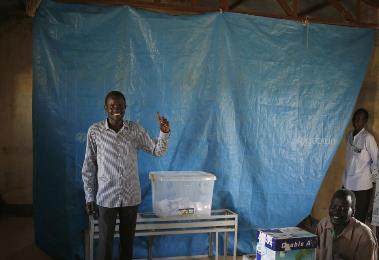Abyei community says it was “forced” to hold unilateral vote
October 29, 2013 (JUBA)- Leaders from the disputed oil-producing region of Abyei, whose territorial ownership remains contested between Sudan and South Sudan, say “they have been forced by inaction” by the African Union to hold a unilateral vote to decide whether to remain in Sudan or return to South Sudan.

Multiple voters, including senior officials in the South Sudanese government who hail from the area, told Sudan Tribune that up to 100,000 people are expected to turn out to cast their vote.
The majority of voters are members of the nine Ngok Dinka chiefdoms, who have returned in preparation for the plebiscite.
The decision to take unilateral action has attracted concern from regional and international institutions, amid fears it could renew tensions in the area, as well as cause an escalation in tribal conflict.
Community leaders decided to proceed with the conduct of a referendum this month after expressing dissatisfaction with how international actors, particularly the African Union (AU), were handling the dispute.
“As you are aware, the people of Abyei have been forced to conduct their own referendum as a result of inaction by the African Union Peace and Security Council (AUPSC) to implement the African Union High-Level Implementation Panel (AUHIP) proposal on the final status of Abyei, including the conduct of a referendum in October 2013”, said Deng Alor, the head of the Abyei high referendum committee
Alor said the three-day community vote got underway on Sunday and is expected to end on Tuesday, stressing that the exercise was being conducted in a peaceful environment.
“I am delighted to share with you that the Abyei area community referendum has been conducted by an independent and credible commission with a high level of good organisation, transparency and in a peaceful environment”, he said in a statement obtained by Sudan Tribune on Tuesday.
“The women and youth of Abyei have volunteered to assist in organising a peaceful referendum in accordance with internationally accepted standards, Abyei Protocol, the ruling of the Hague International Border Court of Arbitration and the AUHIP proposal on the final status of Abyei”, the statement adds.
The statement which is dated 28 October explained that security during the vote was being provided by an Abyei women’s organisation called Pion Tok (One Heart) in collaboration with community police.
A planned referendum on Abyei due to be held simultaneously with that of South Sudan in 2011, failed to take place after both countries failed to agree on who was eligible to participate in the vote.
Sudan insists that the nomadic Arab Misseriya tribe – many of whom enter the region to graze their cattle for part of the year – should be allowed to participate.
However, under an AU-backed proposal only the Ngok Dinka permanently residing in the area would be allowed to take part in the plebiscite.
Ongoing negotiations between Sudan and South Sudan have failed to resolve the impasse.
The South Sudanese government has called on the African Union Commission (AUC) to take full responsibility of the matter in accordance with the 2012 roadmap and United Nations Security Council resolution 2046 which gives the continental body authority to take a decision in the event that the two countries are unable to reach an agreement.
In a strongly worded statement issued on Monday, the AUC condemned the decision to hold a unilateral vote as an “illegal” act.
But in comments made earlier this week, Arop Madut Arop, a member of parliament in Juba representing the area, said nothing which would stop the people of Abyei from determining their fate, adding that all other avenues had been exhausted.
The declaration of the results of the Abyei referendum is due to be announced on 31 October in Abyei town.
(ST)
